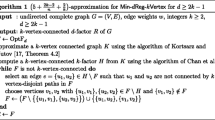Abstract
We give quasipolynomial-time approximation algorithms for designing networks with minimum degree. Using our methods, one can design one-connected networks to meet a variety of connectivity requirements. The degree of the output network is guaranteed to be at most (1+ε) times optimal, plus an additive error of O(log n/ε) for any εs0. We also provide a quasipolynomial-time approximation algorithm for designing a two-edge-connected spanning subgraph of a given two-edge-connected graph of approximately minimum degree. The performance guarantee is identical to that for one-connected networks.
As a consequence of our analysis, we show that the minimum degree in both the problems above is well-estimated by certain polynomially solvable linear programs. This fact suggests that the linear programs we describe could be useful in obtaining optimal solutions via branch-andbound.
Research supported by an IBM Graduate Fellowship. Additional support provided by NSF PYI award CCR-9157620 and DARPA contract N00014-91-J-4052 ARPA Order No. 8225.
Research supported by NSF grant CCR-9012357 and NSF PYI award CCR-9157620, together with PYI matching funds from Thinking Machines Corporation and Xerox Corporation. Additional support provided by DARPA contract N00014-91-J-4052 ARPA Order No. 8225.
Preview
Unable to display preview. Download preview PDF.
Similar content being viewed by others
References
A. Agrawal, P. Klein and R. Ravi, “When trees collide: an approximation algorithm for the generalized Steiner tree problem on networks,” Proceedings of the 23rd Annual ACM Symposium on Theory of Computing (1991), pp. 134–144.
A. Agrawal, P. Klein and R. Ravi, “How tough is the minimum-degree Steiner tree? An approximate min-max equality (complete with algorithms)”, TR-CS-91-49, Brown University (1991), Submitted to SIAM J. on Disc. Math.
D. Bauer, S.L. Hakimi, and E. Schmeichel, “Recognizing tough graphs is NP-hard,” Disc. Appl. Math. 28 (1990), pp. 191–195.
V. Chvátal, “Tough graphs and Hamiltonian circuits,” Disc. Math. 5 (1973), pp. 215–228.
J. Edmonds, and E. L. Johnson, “Matching, Euler tours and the Chinese postman”, Math. Prog. 5, (1973), pp. 88–124.
M. Fürer and B. Raghavachari, “An NC approximation algorithm for the minimum-degree spanning tree problem,” Proceedings of the 28th Annual Allerton Conference on Communication, Control and Computing (1990), pp. 274–281.
M. Fürer and B. Raghavachari, “Approximating the minimum-degree spanning tree to within one from the optimal degree”, Proceedings of the Third Annual ACM-SIAM Symposium on Discrete Algorithms (1992), pp. 317–324.
M. Fürer and B. Raghavachari, “Approximating the minimum-degree spanning and Steiner trees to within one from the optimal degree”, TR CS-92-13, Pennsylvania State University, June 1992.
M. R. Garey and D. S. Johnson, Computers and Intractability: A guide to the theory of NP-completeness, W. H. Freeman, San Francisco (1979).
M. X. Goemans, and D. P. Williamson, “A general approximation technique for constrained forest problems”, Proceedings of the Third Annual ACM-SIAM Symposium on Discrete Algorithms (1992), pp. 307–316.
P. Klein and R. Ravi, “Approximation through uncrossing: From edge-cuts to node-cuts,” submitted to the Fourth Annual ACM-SIAM Symposium on Discrete Algorithms.
G. L. Nemhauser, and L. A. Wolsey, Integer and Combinatorial Optimization, Wiley Interscience series in Disc. Math. and Optimization (1988).
Author information
Authors and Affiliations
Editor information
Rights and permissions
Copyright information
© 1992 Springer-Verlag Berlin Heidelberg
About this paper
Cite this paper
Ravi, R., Raghavachari, B., Klein, P. (1992). Approximation through local optimality: Designing networks with small degree. In: Shyamasundar, R. (eds) Foundations of Software Technology and Theoretical Computer Science. FSTTCS 1992. Lecture Notes in Computer Science, vol 652. Springer, Berlin, Heidelberg. https://doi.org/10.1007/3-540-56287-7_112
Download citation
DOI: https://doi.org/10.1007/3-540-56287-7_112
Published:
Publisher Name: Springer, Berlin, Heidelberg
Print ISBN: 978-3-540-56287-0
Online ISBN: 978-3-540-47507-1
eBook Packages: Springer Book Archive




